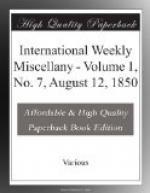The very young have never, perhaps, read one of the tales of a lady whose reputation as a novelist was in its zenith when Walter Scott published his first novel. We desire to place a chaplet upon the grave of a woman once “celebrated” all over the known world, yet who drew all her happiness from the lovingness of home and friends, while her life was as pure as her renown was extensive.
In our own childhood romance-reading was prohibited, but earnest entreaty procured an exception in favor of the “Scottish Chiefs”. It was the bright summer, and we read it by moonlight, only disturbed by the murmur of the distant ocean. We read it, crouched in the deep recess of the nursery-window; we read it until moonlight and morning met, and the breakfast-bell ringing out into the soft air from the old gable, found us at the end of the fourth volume. Dear old times! when it would have been deemed little less than sacrilege to crush a respectable romance into a shilling volume, and our mammas considered only a five-volume story curtailed of its just proportions.
Sir William Wallace has never lost his heroic ascendancy over us, and we have steadily resisted every temptation to open the “popular edition” of the long-loved romance, lest what people will call “the improved state of the human mind”, might displace the sweet memory of the mingled admiration and indignation that chased each other, while we read and wept, without ever questioning the truth of the absorbing narrative.
Yet the “Scottish Chiefs” scarcely achieved the popularity of “Thaddeus of Warsaw”—the first romance originated by the active brain and singularly constructive power of Jane Porter—produced at an almost girlish age.
The hero of “Thaddeus of Warsaw” was really Kosciuszko, the beloved pupil of George Washington, the grandest and purest patriot the modern world has known. The enthusiastic girl was moved to its composition by the stirring times in which she lived, and a personal observation of and acquaintance with some of those brave men whose struggles for liberty only ceased with their exile or their existence.
Miss Porter placed her standard of excellence on high ground, and—all gentle-spirited as was her nature—it was firm and unflinching toward what she believed the right and true. We must not therefore judge her by the depressed state of “feeling” in these times, when its demonstration is looked upon as artificial or affected. Toward the termination of the last, and the commencement of the present century, the world was roused into an interest and enthusiasm, which now we can scarcely appreciate or account for; the sympathies of England were awakened by the terrible revolutions of France and the desolation of Poland; as a principle, we hated Napoleon, though he had neither act nor part in the doings of the democrats; and the sea-songs of Dibdin, which our youth now would call uncouth and ungraceful rhymes, were key-notes to public feeling; the English




